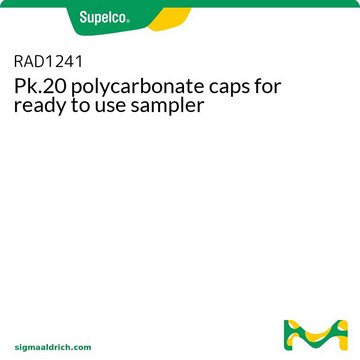2879901-U
Inlet Liner, Split/Splitless Type, Single Taper FocusLiner™ Design (wool packed)
pkg of 1 ea
About This Item
Recommended Products
packaging
pkg of 1 ea
L × O.D. × I.D.
78.5 mm × 6.3 mm × 4.0 mm
Looking for similar products? Visit Product Comparison Guide
General description
- Fits Agilent (5890, 6890, and 7890)
- Fits Finnigan (9001GCQ)
- Fits Varian (CP-1177 Injector)
Legal Information
Storage Class
13 - Non Combustible Solids
wgk_germany
WGK 3
flash_point_f
Not applicable
flash_point_c
Not applicable
Choose from one of the most recent versions:
Certificates of Analysis (COA)
It looks like we've run into a problem, but you can still download Certificates of Analysis from our Documents section.
If you need assistance, please contact Customer Support
Already Own This Product?
Find documentation for the products that you have recently purchased in the Document Library.
Articles
Pistachios contain approximately 45% fat, which can result in a significant amount of coextracted matrix in the acetonitrile extract generated using the QuEChERS procedure. A zirconia based adsorbent significantly reduces coextracted matrix prior to LC-MS or GC-MS.
A procedure for cleanup of green tea extracts provides low background and allowed for the analysis of more pesticides at lower levels than QuEChERS. Uses less solvents and no toluene.
Pesticide residue testing of turmeric and other (dried) spices is challenging due to their complex compositions and high matrix. An efficient SPE clean-up can be achieved by a new Dual-layer cartridge.
The odor and pungency of ginger is due to the presence of terpenes, gingerols and shogaols. These compounds contribute to the highly complex matrix of ginger, which subsequently presents a challenge in low level analyses of contaminants. A novel 2-layer SPE cartridge efficiently reduces background for pesticide determination.
Protocols
Paprika is a spice made from dried sweet peppers, and is used for flavor and color in many types of cuisine. Contamination with polynuclear aromatic hydrocarbons (PAHs) can occur when pepper plants are exposed to these pollutants in the environment and/or during the drying process.
Our team of scientists has experience in all areas of research including Life Science, Material Science, Chemical Synthesis, Chromatography, Analytical and many others.
Contact Technical Service






